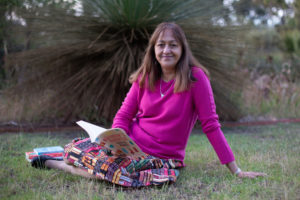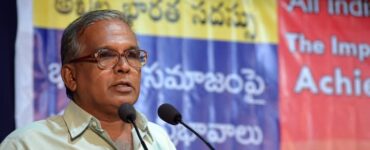
They took English classes with other refugees and immigrants, acquiring words for things they lost or didn’t have.
In Search of Space Lost – Aleksander Hemon
The Program Manager at the community centre was a cheerful man, curly hair greying at the temples, scraggy beard. I was fresh out of an ESL training college, nervous about my first time in front of a class. He scratched his beard, grinned and said I wouldn’t be doing much teaching.
‘Don’t let it get you down,’ he said. ‘They’ve picked up survival-without-English skills, ha-ha. Their last teacher found it most useful to make animal noises and have them guess what he was doing. Each to his own, hey? Most of these guys here are not quite literate in their own languages anyway. Some bring their kids in when they enrol. Do what you can. We’re easy.’
The Albanian woman always sat on the same chair. If she was late and someone else took her seat, she stood next to the person, usually the elderly Vietnamese man, until he looked up. He’d get up and she’d sit down. They did not exchange too many words in the months I taught them, which wasn’t unusual. English eluded them with an awkwardness they found insurmountable. My dedication to teaching them English was matched by their determination to have a good time, in their own languages.
The other teachers – there were six of us in various fractions of employment – seemed amused at first at my attempts to generate language by scripting everything I said and waiting for my class to respond.
‘Ah, to be young and enthusiastic again,’ they teased when I skidded into the staff room for a late coffee. ‘Sit. Take a load off. They aren’t going anywhere. We mean that. Literally.’
‘Well, that’ll change. You’ll see. I’ll have them all talking by month’s end.’
‘They are talking. God. It’s hard to shut them up. That’s a good sign. Don’t stress. Don’t wear yourself out.’
I spent hours cutting up pictures from magazines and pasting them on poster sized card paper, thinking of ways to steer them away from their ‘insufficient’ English without being heavy handed. Once, I asked them to bring pictures of heroes from their own countries. I held up pictures of Nelson Mandela and Princess Diana to demonstrate what I meant. They muttered, snuck glances at me, lowered their bodies deep into their chairs and fell silent. The following day they brought in ratty women’s magazines, salvaged from doctors’ waiting rooms, and flicked through the pages, pointing at celebrities they recognised.
They laughed at the sloppy sandwiches I pulled out of my bag at lunchtime and started sharing their food with me, then bringing me extra for the children. After the first week I was taking home all the food left over from lunch. On the train. Plastic bags at my feet, scented with garlic, soy, sumac, lemongrass, sesame oil, tamarind, chilli paste. Pho, bun cha, lamb stew, byrek, fried chicken, and people screwing their noses and moving as far away as they could. Children held their noses and asked loudly, what’s that smell? Their parents glanced at the bags at my feet and shushed them while turning away from me.
The Vietnamese man had been a chef before making the boat journey to Australia. Now that he had people to cook for, he was happy. The Afghan sisters brought fragrant stews and nutty rice, giggling that their food wasn’t as hot as I was used to, and the silent Albanian produced beautiful pastry encased dishes that melted in the mouth. It made no difference when I protested they brought too much food; they waved their arms about and told me I needed to eat more.
After three months we understood why the Albanian lady always wanted the third seat from the right. It was in the centre of the room, far away from windows, close to the stairs. She wrote it down on a piece of paper and thrust it at me. She had beautiful writing, curvy and slanting sweetly over the page, capitals and punctuation firmly in place. I am from Vlore, she wrote. My city beautiful. Mountain, sea. When bad people make gangs in the city they throw fire through windows. My ears no good with noise. I cannot sit close to windows. I understand what you say. I speak Albanian, Russian, Greek, Turkish but this English make me sad. I feel sad you work so hard I don’t speak. You are good teacher. I make this letter with Greek dictionary.
I went over and stood beside her chair. She got up and hugged me. As I stepped away, they stepped up, all fifteen of them, young, old, men, women. They stood in the middle of the room behind me, and took turns hugging her. She offered a smile, a nod, benediction. Her longest hug was reserved for the chef, and when he moved back to his seat, we were all crying. Telling them what she’d written was easy. I asked her permission and then I read it out. They nodded. They clapped. They volunteered words of their own. Bomb. Boat. Water. Fire. Prison. Refugee. Home. Hot. Hard. Sad.
After the fourth month I started taking them out on regular excursions. I had given up on learning outcomes and reports after the Program Manager waved away the sheets I placed on his desk every week.
‘They love you,’ he said. ‘Don’t worry about ticking boxes. We’re easy here. You’re doing a great job.’
‘Can I take them to the Art Gallery?’
‘Knock yourself out.’
At the Art Gallery café they ordered coffees, drinks and muffins. To mix it up I told them they couldn’t order the same things. It took forty minutes but they all had a go. Some would come back halfway through an order to ask the English name of something in a language none of us understood. The rule was they had to ask, not point to what they wanted, and they played the game earnestly. It got easier over the next few weeks. They rehearsed ahead of time, checked with each other, helped the ones who didn’t feel like smiling on the day and chattered so much it was easy to forget why I was there with them. The tall boy with pierced eyebrows talked to them as he made their coffees, telling them about his naturopathy course and the traffic in the city. He had started riding a bike to work, he said, to reduce his carbon footprint. He was vegetarian, which was why he liked working at the café. He just made the coffee and washed up afterwards. He didn’t need to make sandwiches and he was happy about that. They listened intently and told me what a good boy he was, how his mother was so proud of him and claimed him as their own. He was Serbian, he was Greek, he was Filipino, he was from Bali.
I threw away the rest of my lesson plans.
A few weeks later the Gallery had a Frederick McCubbin perspective. It was free, so after the coffee rituals were done I took them to gaze at pioneers, lost girls and men down on their luck. The chef stared into the distance until I told him the painter’s father was a baker. This revitalised him and he spent the rest of the afternoon searching for food in the paintings. The Albanian woman sighed several times and murmured, a hand pressed to her heart, spending longest in front of A Bush Burial. The Afghan sisters sat on the bench watching their friend look at the paintings, until I tapped them on the shoulder and they jumped up, anxious they had missed something.
‘She’s fine,’ I told them. ‘Art makes you cry sometimes.’
‘And music,’ said one girl.
‘Good cry,’ the other said.
‘Yes, a good cry,’ I agreed.
Back at the Centre, the teacher running the Intermediate classes smiled and beckoned me to her side at the photocopier. With a quick look around she said softly, ‘Great job. Their confidence levels are increasing.’
‘Thanks,’ I said. ‘Hopefully that’ll encourage language and we can do real lessons in the time we have left. They’ll sort their tenses out in no time.’
‘Don’t worry about it. Most of them have been coming here for years. Sima, Adela, the old guy and his sidekick … I’ve been here three years and most of mine have come and gone; not this lot though. They just enjoy each other’s company, we figured.’
‘What will happen now? You know, after?’
‘After your time is done? Depending on funding, they come to me for six months, or they go home and wait for another free course. The objective is to move them along to formal learning. But …’
I nodded.
She nodded. ‘Might be a bit late for this – but try not to get too attached.’
Sage words, but she was right. It was too late.
In the last week of the last month we spent together, they started asking if I would be with them next term. I shrugged while pointing to the phonetic alphabet and the list of words beside it. They looked at each other, and back at me. Savage Garden and the Spice Girls held little appeal in those days – and lunches tasted like last suppers. I was upbeat and refused to turn around when I felt their eyes boring into my back. I talked too much, told jokes they barely understood and smiled when the Albanian lady placed her bag down on the floor with a thump and glared at me. The Afghan sisters wiped away tears with the ends of their hijab. The chef sat with his arms folded across his chest and a boy simply lay his face sideways on the desk and refused to look up. The two women who always came together stopped coming and when I asked about them, the boys who used to take the train with them shrugged and said they had gone away. It was starting to feel like Doomsday.
Then, one by one, they started bringing in objects and photos to show me. From the girls, a tablecloth they were embroidering, a sofreh, they told me, and I remembered the word from childhood. We used to sit down on decorated tablecloths for a shared meal, laughing at the overweight aunties who groaned and folded their feet under their soft bottoms and needed help to get up. This sofreh was unlike anything I remembered. It was round with a frilled lace edge. A large embroidered peacock decorated with sequins dominated the centre while little green leaves and pink flowers dotted the rest.
‘For wedding,’ Gulnoor nudged her sister and giggled. ‘From Kabul. My country.’ Her sister stroked her arm and kissed the top of her head.
I wrote the words ‘trousseau’ and ‘henna’ on the whiteboard, along with ‘dowry’ and ‘glory box.’ They laughed at the idea of having sufficient objects to put inside a box of the proportions I showed them, pushing together two desks to show them how wide, tall and deep the boxes could be. They acquired more vocabulary that day than they had in a month, especially when Mira started humming a little song she explained was a wedding song. From her capacious bag she extracted a notebook and pencil and sketched the costumes worn during Albanian weddings. She clicked her fingers together to indicate that money changed hands and pointed to the word ‘dowry’ on the board and nodded. The chef folded his hands in his lap and shook his head several times and for a while there was a hush, a silence no one cared to break. Gulnoor cried and her sister held her in her arms and rocked her.
The next day Duong and Cris staggered in with so much food the girls and I held the door open while they brought in bag after bag, chattering and ignoring me when I asked what they were thinking.
‘Feast,’ said Cris after the last bag had been deposited on the teacher’s desk. ‘Wedding feast. For Gulnoor.’
‘Vegetables only,’ added Duong, with a kind smile at the Afghan girls who stood by the door, mouths half-open, clutching each other’s hands and trying not to cry.
It seemed fitting that Cris choose the music and the sounds of Is this love filled the room while we decided to forgo lessons for the day and have a trial run for Gulnoor’s wedding by eating as much as we could. The curly haired manager put in a rare appearance and twirled around the room with Mira because no wedding can be complete without a dance. Cris tried to teach me the macarena while Mira continued twirling on her own for a long time, lost. The chef kept filling up plates and taking them round the room, and we collapsed on chairs, listening to a cacophony of languages and recognising laughter in each one.
The last day of term coincided with the wettest day of the year. A furious July deluge capsized my brolly as I sloshed my way through the puddle forming outside the door to the centre. The others opened the door for me and we stood there, laughing and stamping our feet, saying Bill had better put on a good party with chocolate and real coffee and champagne.
‘Don’t expect your lot to come,’ said the friendly teacher. ‘Some might, most won’t. They hate goodbyes. Plus, rain. Perfect excuse.’
I set up the silent classroom with their writing efforts over the term. In my neatest handwriting I wrote their names on the whiteboard, using different colours based on what I remembered of their preferences. They were accomplished artists, having learned early to draw what they couldn’t say. The ubiquitous world map was blu-tacked on and as I’d paid for it, I thought defacing it with markers wouldn’t hurt. I drew hearts around Albania, Bosnia, Afghanistan, Iraq, India, Vietnam, Philippines, China, Java, Ecuador and Bolivia.
Two boys walked in to the sounds of spice up your life and clapped, came around the desk and held their arms out for a hug. They smelt of cigarettes and damp.
‘Come,’ said Cris. ‘No class today. We go outside.’
The other boy nodded, as he always did, and pointed outside. ‘Not raining.’
I showed them my convulsed umbrella and they laughed, asked if I had a raincoat and urged me out.
‘Just going out for a coffee,’ I yelled through the door at my colleagues and they shouted ‘crazy’ back. I tapped Cris on the arm and dashed back into the classroom, ripped the map off the wall, rolled it up, and walked back to where the boys were.
‘No study today,’ the Bolivian said with as much disgust as he could muster.
‘No, we are not going to study. I have something to show you. And the others.’
At the café, plastic blinds were flapping in the wind and everyone was huddling over their coffees but at least it wasn’t raining. We walked towards the entrance, hunched against an icy wind, the boys offering me a cigarette and grinning when I wagged my finger at them. Inside, warm coffee smells, and the whole class. All except the chef sitting there with smug faces and an array of food and drink before them. The boy with piercings raised a dishcloth in greeting and I sat down.
‘Well, you know this is against the rules? You should be studying on your last day, so you can graduate and go to Jill’s class. You are like naughty children,’ I said.
Duong appeared at my elbow with a coffee and a chocolate brownie that he placed on the table before me. ‘Flat white,’ he said. ‘You like flat white.’
‘Flat white,’ Mira said. ‘Why do they call coffee flat?’
‘Why don’t you ask the boy who makes them? I really don’t know why. I’m an immigrant too. We used to have white coffee and black coffee where I come from.’
Cris offered his arm to Mira and they wandered over to the boy making coffee and chatted briefly to him.
‘Well?’ I asked when they sat down again.
‘Because it is Australian. No use learning English because it changes. All the time. Coffee is not flat and not white but Australians make this. He is good boy.’ Mira laughed as she sat down.
‘I’m sure that’s not what he said.’
‘Yes, yes. He says we are Aussie now. Noisy. We are Aussie.’
‘Australian,’ I said. ‘None of this slang in my class, thank you.’ I pushed aside cups and plates, unfurled my map and showed them what I’d done. They pointed at their countries, heart borders bleeding into each other.
Bio:
Rashida Murphy lives and works in the city known as Perth on the unceded lands of the Whadjuk Noongar people of Western Australia. She is the author of a novel and a collection of short stories as well as a contributor to several anthologies and journals, as a poet, essayist and fiction writer.









Heart touching. Thank you